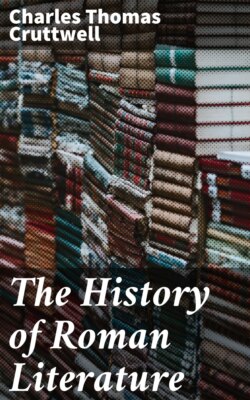Читать книгу The History of Roman Literature - Charles Thomas Cruttwell - Страница 40
На сайте Литреса книга снята с продажи.
ОглавлениеWe notice that there are in this decree no doubled consonants, no ablatives without the final d (except the two last words, which are probably by a later hand), and few instances of ae or i for the older ai, ei; oi and ou stand as a rule for oe, u; ques, eeis, for qui, ii. On the other hand us has taken the place of os as the termination of Romanus, Postumius, &c., and generally u is put instead of the older o. The peculiarities of Latin syntax are here fully developed, and the language has become what we call classical. At this point literature commences, and a long succession of authors from Plautus onwards carry the history of the language to its completion; but it should be remembered that few of these authors wrote in what was really the speech of the people. In most cases a literature would be the best criterion of a language. In Latin it is otherwise. The popular speech could never have risen to the complexity of the language of Cicero and Sallust. This was an artificial tongue, based indeed on the colloquial idiom, but admitting many elements borrowed from the Greek. If we compare the language and syntax of Plautus, who was a genuine popular writer, with that of Cicero in his more difficult orations, the difference will at once be felt. And after the natural development of classical Latin was arrested (as it already was in the time of Augustus), the interval between the colloquial and literary dialects became more and more wide. The speeches of Cicero could never have been unintelligible even to the lowest section of the city crowd, but in the third and fourth centuries it is doubtful whether the common people understood at all the artificially preserved dialect to which literature still adhered. Unfortunately our materials for tracing the gradual decline of the spoken language are scanty. The researches of Mommsen, Ritschl, and others, have added considerably to their number. And from these we see that the old language of the early inscriptions was subjected to a twofold process of growth. On the one hand, it expanded into the literary dialect under the hands of the Graecising aristocracy; on the other, it ran its course as a popular idiom, little affected by the higher culture for several centuries until, after the decay of classical Latin, it reappears in the fifth century, strikingly reminding us in many points of the earliest infancy of the language. The lingua plebeia, vulgaris, or rustica, corrupted by the Gothic invasions, and by the native languages of the other parts of the empire which it only partially supplanted, became eventually distinguished from the Lingua Latina (which was at length cultivated, even by the learned, only in writing,) by the name of Lingua Romana. It accordingly differed in different countries. The purest specimens of the old Lingua Romana are supposed to exist in the mountains of Sardinia and in the country of the Grisons. In these dialects many of the most ancient formations were preserved, which, repudiated by the classical Latin, have reappeared in the Romance languages, bearing testimony to the inherent vitality of native idiom, even when left to work out its own development unaided by literature.
